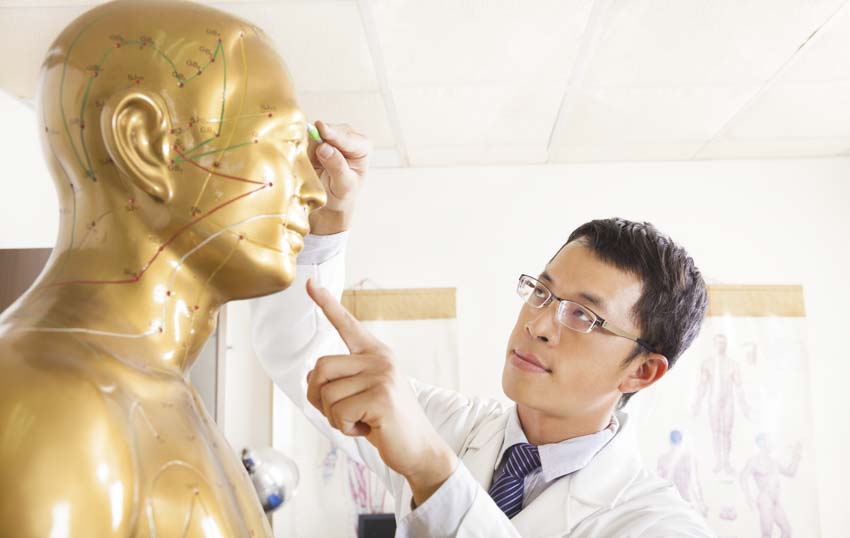
Acupuncture aids swallowing for post-stroke dysphagia patients. Researchers at the Second Affiliated Hospital of Liaoning University of Traditional Chinese Medicine (Shenyang, China) found combining acupuncture with standard functional training improves outcomes for patients with dysphagia and other symptoms following a stroke. The study outcomes included overall neurological function scores, Traditional Chinese Medicine (TCM) syndrome scores, water swallowing test scores, and overall efficacy. Although both groups showed improvements following four weeks of treatment, outcomes were superior across all areas in the acupuncture group. [1]
All patients had a diagnosis of post-stroke dysphagia (according to biomedical and TCM parameters) that was confirmed by a CT or MRI scan. Symptoms including dysphasia, difficulty swallowing or chewing, coughing or choking when drinking water, dyskinesia of the soft palate, throat, tongue, or facial muscles, weak or absent pharyngeal reflexes, hyperactive mandibular reflexes, and other pathological reflex responses were evaluated. Associated symptoms included limb hemiplegia, stiff tongue, deviated eyes or mouth, headaches, and sensory impediment.
TCM diagnostic criteria included a dull-purple tongue, and sinking-rough or bound-intermittent pulses. Patients were ages 59–78 years, had not recently undergone treatment for their condition, had well-controlled blood glucose and blood pressure levels, and gave informed consent to participate in the study. Patients were excluded that did not meet the diagnostic criteria, suffered from serious heart, brain, or kidney disease, liver or kidney failure, were pregnant or lactating, had poor compliance, or had psychological conditions rendering them unable to give informed consent or complete clinical data.
A total of 98 patients were recruited for the study and were randomly assigned to the acupuncture group (n=49) or the control group (n=49). The acupuncture group was comprised of 34 male and 15 female patients with a mean age of 58.8 years. The mean duration of disease was 46.2 days. Of the patients in the acupuncture group, 21 suffered cerebral infarctions, 28 had brain hemorrhages, 32 had brainstem lesions, and 17 had cerebral lesions.
The control group was comprised of 18 male and 31 female patients with a mean age of 58.5 years. The mean duration of disease was 39.3 days. Of the patients in the control group, 24 suffered cerebral infarctions, 25 had brain hemorrhages, 30 had brainstem lesions, and 19 had cerebral lesions. There were no statistically significant differences between the two groups prior to treatment.
Treatment
Both groups were treated with standard functional training to improve swallowing and other symptoms. These included therapies to improve local micro-circulation and maintenance of electrolyte balance, as well as pharyngeal exercise training. Pharyngeal exercises included vocal and breathing exercises, direct feeding training, and stimulating ‘empty swallowing’ by gently irritating the soft palate, tongue, and throat with a cotton swab dipped in cold water. Participants assigned to the acupuncture group had treatment administered at the following acupoints:
- Fengchi (GB20)
- Wangu (GB12)
- Yifeng (TB17)
- Fengfu (GV16)
- Yamen (GV15)
- Lianquan (CV23)
Each point was inserted using a 0.20 × 40mm filiform needle and was stimulated for five minutes using a twisting and rotating, reinforcing technique. Needles were retained for an additional 20 minutes. Treatment was administered daily, for a total of four weeks.
Results
Outcome measures for the study included neurological function scores, water swallowing test results, TCM syndrome scores, and total efficacy. The neurological function test rated the participants’ consciousness, speech, gaze, limb muscle strength, and walking ability on a scale of 0–45.
Scores of 0–15 indicated mild dysfunction, 16–30 indicated moderate dysfunction, and 31–45 indicated severe dysfunction. Mean neurological function scores prior to treatment were 29.14 in the acupuncture group and 27.65 in the control group. After four weeks of treatment, scores fell to 9.88 and 16.54 respectively, indicating significantly greater improvements in the acupuncture group.
The water swallowing test required participants to drink 30 mL of water while being observed and timed. Before treatment, mean scores for the water swallowing test were 7.29 in the acupuncture group and 7.32 in the control group. Following treatment, these scores increased to 9.66 and 8.48 respectively. Although both groups showed improvements, the mean score was greater in the acupuncture group.
TCM syndrome scores were measured in the areas of difficulty swallowing, choking or coughing while drinking, limb hemiplegia, and tongue stiffness/dysphasia. In the acupuncture group, mean scores prior to treatment for the above symptoms were 3.69, 3.32, 3.22, and 3.69 respectively. Following treatment, these scores fell to 0.76, 1.14, 0.98, and 0.77 respectively. In the control group, these scores were 3.74, 3.25, 3.25, and 3.78, falling to 1.33, 2.32, 1.57, and 1.35 after treatment. Although both groups showed improvements in all areas, they were significantly greater in the acupuncture group.
The overall efficacy rate was calculated for each group. Patients showing complete resolution of symptoms were classified as cured. Patients showing significant improvement were classified as effective. Patients showing no improvement or a worsening of symptoms were classified as ineffective. The cured and effective rates were added together to give the total effective rate.
In the acupuncture group, there were 30 cured and 18 effective cases, yielding a total efficacy rate of 97.96%. In the control group, there were 25 cured and 19 effective cases, yielding a total efficacy rate of 89.80%. Outcomes were significantly better for patients that had acupuncture treatments.
This study suggests that acupuncture is an effective adjunct to standard functional training for patients suffering from post-stroke dysphagia. Acupuncture has the potential to significantly improve symptoms, including difficulty with swallowing and speech, as well as associated problems including limb hemiplegia.
Reference
1. Li Zhi, Jiao Fuying (2018) “Clinical Study of Acupuncture Combined with Swallowing Training in Treatment of Post-Stroke Swallowing Dysfunction” JCAM, Vol. 34 (10) pp.10-13.


